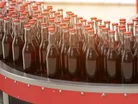Coca-Cola aims for carbon neutral manufacturing sites

Coca-Cola Europacific Partners has announced a significant development in its Net Zero 2040 ambition, after two of its manufacturing sites have been certified as carbon neutral.
The certification of the sites marks an important step in CCEP’s Net Zero 2040 ambition, and a separate target to reduce its value chain emissions by 30% by 2030.
The certified sites, which also use 100% renewable electricity, are located in:
- Jordbro, Sweden
- Vilas del Turbón, Spain
Coca-Cola aims for carbon neutral manufacturing sites
The sites are CCEP’s first carbon neutral sites, and are part of a pilot programme that aims for at least six CCEP sites to become carbon neutral certified, by the end of 2023.
This programme focuses first on reducing its own value chain emissions, before investing in verified carbon offset projects, prioritising those that remove carbon from the atmosphere, to take away any remaining emissions.
The Jordbro site
- This is CCEP’s sole production facility in Sweden which produces over 350mn litres of beverages each year
- Over the past five years the site has reduced its total emissions to only 1274 tonnes CO2e
- CO2, an ingredient used in carbonated drinks, is sourced from a carbon neutral origin
- LED lighting has also been installed at the site’s warehouse
- All forklift trucks on-site are electric.
The Vilas de Turbón site
- Over the past five years the site has reduced its total emissions to only 87 tonnes CO2e, which is a reduction of 36% per litre of product produced there
- This has been achieved by installing energy efficient LED lighting across the site and adding frequency convertors to its water pumps to improve the efficiency of its water extraction
- A biomass boiler will be installed later this year, which uses sustainably sourced wood pellets, in place of fossil fuels to create electricity
Coca-Cola is dedicated to reducing emissions across the supply chain
To offset the remaining emissions at both sites, CCEP has purchased Gold Standard certified carbon credits from a reforestation project in Orinoco, Colombia.
This carbon sequestration project will support an area of savannah that has been damaged by agricultural activity through reforestation and the restoration of its ecosystem.
For José Antonio Echeverría, Chief Customer Service and Supply Chain Officer at CCEP, driving effective long-term change in Coca-Cola’s environmental impact is a key priority.
“We have committed to reducing emissions as far as we can before offsetting”, explains Echeverría. “We’re delighted to recognise this significant milestone for CCEP, and the teams who are helping us to accelerate our progress in reducing our emissions across our supply chain. This is a very important moment, and a great example of how our innovation is helping to bring us closer to our net zero ambition.”



